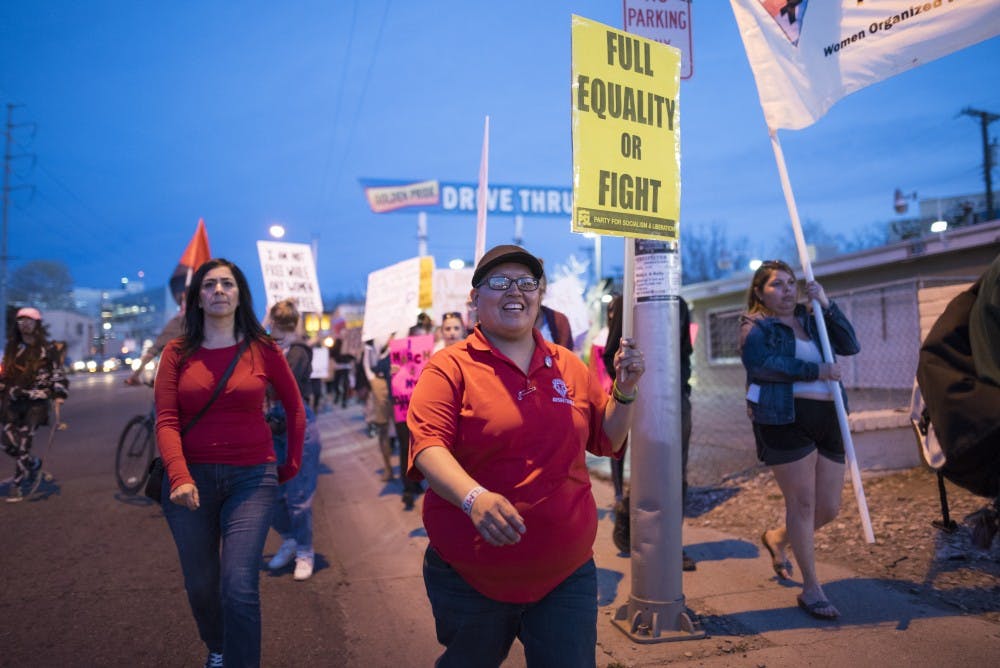In the midst of Women’s History Month, WalletHub began ranking how women fare in each state, and New Mexico came in at 43rd — ninth worst in the nation.
The study compared each state and Washington D.C. across 19 metrics. Areas in which New Mexico is notably poor: unemployment rate for women, share of women in poverty, high school dropout rate for women, female uninsured rate, quality of women’s hospitals and women’s preventive healthcare.
Associate history professor Cathleen Cahill said the statistics are not surprising, due to the state’s extensive history of a “rural population, poverty and isolation, resulting in difficulties for women and children.”
Cahill, who teaches U.S. women’s history, said because the position of women and children are high indicators of a society’s health and strength, all of the study’s findings are troubling, especially when considering how each statistic affects another.
“When we fail to educate people, they wind up poorer and less healthy,” she said, which raises concern about healthcare and education cuts at national and state levels, such as the potential elimination of the Affordable Care Act, which would affect the state’s ability to tackle these issues.
“We can make these statistics even worse, or we can start working to improve the lives of women in New Mexico. That’s going to mean prioritizing the health and welfare of our citizens,” Cahill said.
The state’s more-median-rankings for female life expectancy and women voter turnout are also notable, she said.
When it comes to life expectancy, Cahill said, New Mexico women clearly “have something that keeps them going” despite all of the difficulties they face.
Women’s Resource Center Director Jessica Hidalgo Holland said America has a history and “very current presence” of policies and belief systems that are working against women attaining “true equality.”
“New Mexico is one of the most under-resourced states, so naturally we are going to be feeling the effects even more,” Hidalgo Holland said. “There’s no denying we need major change.”
She also discussed the aspect of sexual assault in our state, having experience assisting trauma victims at her own private practice, along with five years of work at the Albuquerque SANE Collaborative where local nurses offer free sexual assault and domestic violence exams.
“I hold with me countless stories of women being assaulted, usually by men they trusted. I see daily how our system is failing them and not designed to keep us safe,” she said. “A part of me is always sad yet the healing I witness and the incredible people working to improve the lives of women gives me hope.”
Get content from The Daily Lobo delivered to your inbox
Cahill said voting for politicians interested in issues concerning women and children may be a small step to improving the lives of women attending UNM or living in New Mexico, but that’s not a full solution.
“Voting isn’t enough; continuing to put pressure on those politicians is also important. Keep up with what they are doing, let them know you are watching and make sure their decisions and votes are helping women,” she said.
Still, Cahill sees New Mexico as “a great state with so much potential.”
Cahill feels if New Mexico is able to improve the lives of women, it might be able to stand as a role model for other states, particularly through resources like UNM and UNMH.
Other community and University resources are also available to assist women.
“Like many people, I believe that investing in women and girls is one of the surest ways to improve a community,” Hidalgo Holland said. “It’s important for us to stay aware and focused on the bigger picture while also addressing what is right in front of us.”
Holland said the WRC supports women in many of the study’s areas of scrutiny by helping alter state and University policies on sexual assault/harassment response; providing free counseling and advocacy; offering academic advisement, scholarships and a computer lab; and heading leadership, wellness and gendered-violence prevention programs.
Cahill said programs like the UNM Children’s Campus are also taking steps to improve the lives of women, while off campus programs such as Crossroads for Women are similarly taking strong initiative.
Based on their geographical location in our state and whether they are a historically marginalized group, some women face more challenges than others, Cahill said.
As an impoverished state with historical events of invasion and struggle, “the people here also have incredible spirit,” with many voices (though often unheard) focusing on women’s issues and promoting women’s rights, she said.
Ultimately, Cahill said, “as difficult as these statistics are to contemplate, I hope they result in some serious soul-searching and actual movement forward toward helping our people.”
Elizabeth Sanchez is a reporter for the Daily Lobo. She can be reached at news@dailylobo.com or on Twitter @Beth_A_Sanchez.






